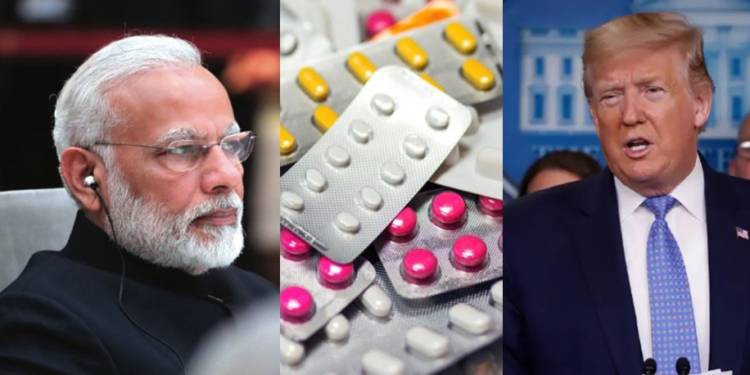Last year, the United States Food and Drug Administration slapped 19 warning letters to various Indian exporters. This was highest in last four years, although, the number of Indian drugs approved for US market has also increased exponentially in last few years.
But the Indian pharmaceutical companies were constantly being harassed by US FDA in the last few years, for political as well as technical reasons. Given the highly protectionist policies of Trump administration, it was understood that Indian companies would be allowed to export to a certain extent given the goodwill between both governments, but at the same time, they would have to pay higher duties and face stricter regulation.
However, after harassment in the last few years, the tables turned after the outbreak of Coronavirus disease. Anecdotal evidences of anti-Malarial drug Hydroxychloroquine (HCQ) being helpful in the prevention of COVID-19 were found and many regulators including the Indian Council of Medical Research approved the drug. Trump on the other hand, has been endorsing the drug every chance he gets to the point that we are now calling it the wonder drug amid Coronavirus Pandemic.
India is a world leader in the manufacturing of anti-Malarial drugs, accounting for more than 70 percent of global supplies, and given the effectiveness of these drugs in the prevention of the disease, the Indian pharmaceutical companies have suddenly gotten the upper hand and a wild card in the American market.
So, Trump asked PM Modi to supply HCQ to United States, but the Indian companies and government saw this right opportunity for negotiation. The US FDA had banned Ipca Laboratories- a company that accounts for 70 percent of global HCQ supply for ‘regulatory violations’ at a manufacturing plant a few months ago, but it has been was forced to lift the ban in March.
“Due to the shortage implications and/or medical necessity of certain drugs and finished products, the United States Food and Drug Administration (FDA) has made an exception to the import alert for the company’s active pharmaceutical ingredients (APIs) of hydroxychloroquine sulphate and chloroquine phosphate produced at the company’s API manufacturing unit situated at Ratlam in Madhya Pradesh,” informed Ipca Laboratories to stock exchanges on March 23.
In order to get HCQ, US administration agreed to give approval to not only Ipca Laboratories anti-Malarial drugs, but many other drugs of other companies like generic acid drug of Cipla on March 26 and Perphenazine tablets- used for for the treatment of schizophrenia and for the control of severe nausea and vomiting in adults- by Zydus Cadila April, 8, today.
It has been claimed by influential Twitter handles that US administration has agreed to lift restrictions on many other Indian drugs. It has promised to give free and fair access of its market to Indian companies in the coming days, and ease the regulations.
The Indian stock market is ripe with rumours that US FDA shall give unrestricted access to Indian Pharmaceutical companies as a result of India’s decision to supply HCQ to the USA despite facing a lockdown, and a huge coronavirus threat locally. In the last two market days, the double-digit rise in almost all pharmaceutical companies’ share market prices, even those which do not manufacture anti-malarial drugs, also suggests the same.
In the last few days, most pharmaceutical stocks have registered a double-digit jump. Yesterday, Nifty Pharma index surged by 10 percent on the news of Indian opening up the export of major drugs to countries around the world including United States.
The sentiment around pharmaceutical companies suggest that US would open up its market to other companies soon after approval of some drug of three major companies in last two weeks. After harassing Indian companies for years, US FDA has been shown its place.
India is one of the largest pharmaceutical exporters with a total export of 12.1 billion dollars, or, 3.4 percent to the global market, and ranks 9th in the list of top global exporters of pharmaceutical products.
The pharmaceutical industry grew at double-digit in the last decade except for the last one or two years, when the growth slowed due to regulations put by the government and other disruptive reforms.
Currently, the industry has an annual revenue of around 1.3 lakh crore rupees or 33 billion United States dollars. The largest players are Dilip Shanghvi led Sun Pharmaceutical, Lupin Limited of Desh Bandhu Gupta, Dr. Reddy laboratories of Reddy’s, Cipla, Aurbindo Pharma, Piramal Enterprise, Glenmark Pharmaceutical, Torrent, Biocon, and Serum Institute. Many Indian billionaires made their fortunes in the pharmaceutical sector, and it is arguably the largest sector in terms of the number of billionaires after the Information Technology-BPM sector.




























